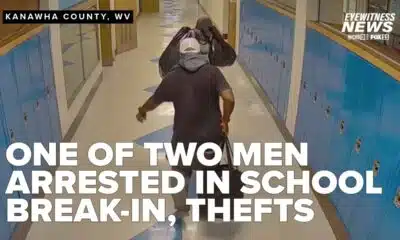News from the South - North Carolina News Feed
Griffin, attorneys retread familiar ground in latest court hearing
As Griffin case drags on, some NC voters can’t help but feel ‘targeted’
RALEIGH — In less than 24 hours, Danielle Brown left an out-of-state bus tour, came home to North Carolina to cast a vote in the 2024 general election and then boarded a plane to rejoin the tour. Now, her vote is one of nearly 67,000 ballots contested by Republican Court of Appeals Judge Jefferson Griffin as part of his attempt to overturn his apparent loss to Democratic Judge Allison Riggs for a seat on the state Supreme Court.
On Election Night, Griffin appeared to be the victor. However, as provisional and absentee ballots were counted, he slowly lost his lead. By the time election staff tallied official results during their canvasses, Riggs was up by a mere 734 votes. Two recounts confirmed Riggs’ win.
[Subscribe for FREE to Carolina Public Press’ alerts and weekend roundup newsletters]
Griffin then filed a series of election protests attempting to discard tens of thousands of ballots from the count, on grounds that the State Board of Elections illegally allowed certain categories of voters to cast a ballot. In the past four months, Griffin’s election protests have journeyed through state and federal courts.
On Friday, a panel of N.C. Court of Appeals judges heard the latest arguments and will decide whether a lower state court was right to affirm the State Board of Elections’ dismissal of Griffin’s protests.
Attorneys for Griffin, Riggs and the State Board covered much of the same territory of the past few months. Their arguments centered on whether the election rules the board established for the 2024 general election were the correct ones, and if they weren’t, whether the law allows Griffin to retroactively remove votes from the count.
Whatever the appellate court decides will be subject to appeal. The case will most likely return to the state Supreme Court, which previously paused election certification until the case is resolved but declined to take it up early.
What Griffin is disputing
Griffin is challenging ballots cast by three categories of voters.
First, he contests the ballots of over 60,000 people Griffin alleges were improperly registered to vote because they didn’t provide either a driver’s license or social security number under a faulty voter registration form. The State Board argues that voters who don’t have these numbers have to prove their identity at the polls, so their votes are valid.
Second, Griffin seeks to remove votes of about 5,500 military and overseas voters who did not include a photo ID with their absentee ballots. He argues that the State Board misinterpreted state law by allowing this category of voters to skip voter ID requirements.
Third, Griffin identified about 500 voters, who he calls “Never Residents,” who don’t live in North Carolina but claim inherited residency through a special state law provision. He argues that the state law violates the North Carolina Constitution’s residency requirements, and therefore, those votes should not count.
‘Taking it very personally’
As the case continues, more voters and organizations are getting involved. Carolina Public Press spoke to several of them.
Brown, a national co-field director for Black Voters Matter, found out that she was on the list through a text from an organization called Democracy NC. Her county board of elections told her they didn’t have her driver’s license on file, but she knows she did everything right.
Black voters like Brown are twice as likely as white voters to be in the largest Griffin challenge. Other voters of color and younger voters also disproportionately appear on his protest lists, according to an analysis conducted by Western Carolina University political science professor Chris Cooper.
“I’m taking it very personally because I do feel as if I am being targeted as a Black woman that works for a Black organization that seeks to empower voting across the country,” Brown said. “You’re making voters feel as if their vote does not count or they have to fight for their vote to count when that’s not democracy.”
Latino voters faced hurdle after hurdle this election, said Veronica Aguilar of El Pueblo, an advocacy group for that community.
The new voter ID law presents more of an obstacle for Latino voters and other voters of color than their white counterparts. Voter education tends to be in English, which may hinder the Latino community from staying updated on election rules. Also, many naturalized immigrants come from countries with different voting laws and election processes which may present a learning curve.
Additionally, Aguilar claims that Latino voters experienced voter intimidation during the election, including a proliferation of “unnecessary” signs telling them that if they aren’t citizens, they can’t vote. U.S. citizenship is required to even register to vote, she said, so this was an effort to make naturalized citizens “question whether or not they could vote.”
The fact that Latino voters disproportionately appear on the protest lists aligns with political rhetoric that immigrants “don’t belong” in the U.S., Aguilar said.
“So even if it is not intentional, it is contributing to the narrative that Latino immigrants, naturalized citizens in this country aren’t allowed to participate in our processes and that their voices don’t count,” she said.
Voters of color aren’t the only ones feeling targeted.
Carrie Conley is a military spouse living in Italy. Last year, she requested her absentee ballot through the Guilford County Board of Elections just like she had done seven times before.
Nobody ever asked for her to attach a photo ID to her absentee ballot because under the State Board’s interpretation, North Carolina law doesn’t require voter identification for military and overseas voters.
Conley heard about the Griffin case on social media, found the list and discovered her name was on it. However, none of her fellow military spouses were on the list. She soon learned that ballots from only four Democratic-leaning counties — Durham, Forsyth, Buncombe and Guilford — were being challenged as part of the photo ID protest.
“Why these four counties? Why now?” Conley asked. “It just makes me very upset that this is happening in my state.”
From 1986 to 2013, Debra Blanton served as Cleveland County’s election director. She loved her job and what it meant to voters to know that their vote would be “sacred,” “safe” and “counted correctly.”
Griffin’s attempt to retroactively take away some North Carolinians’ votes “just really raised the hairs on the back of my neck,” Blanton said.
Blanton is one of 42 former election directors who filed an amicus brief, or “friend of the court” argument, meant to offer courts additional insight.
Election directors, current or former, rarely speak publicly on issues. They make a point of being professionally nonpartisan. But Blanton has never seen anyone try to retroactively remove voters from the rolls like this before.
“It is foreign to me that anybody thinks they could attempt to do that,” she said. “There are rules in place, and the rules in place were in effect for this election.”
By the rules?
What were the rules in place for the 2024 general election?
That’s the question lawyers from Griffin, Riggs and the State Board of Elections’ teams tried to answer Friday for a panel of three N.C. Court of Appeals judges.
Were they rules the State Board established for the election, based on their interpretation of state law and the North Carolina constitution? Or were their interpretations incorrect, deeming those rules invalid?
Griffin lawyer Craig Schaeur argued in favor of the latter. The State Board can’t decide to conduct elections based on rules that violate state law and the North Carolina Constitution, he said.
“To be clear, this case is not about changing laws after the election,” Schaeur said. “It’s a case about enforcing the laws that were already on the books before the election.”
State Board lawyer Nick Brod disagreed. If the State Board’s interpretations were incorrect, there was plenty of opportunity to challenge them before the election, he argued.
The state law allowing so-called “Never Residents” to inherit the residency of their parents in order to vote was passed unanimously in 2011 and has been enforced in over 40 elections since, he explained.
The photo ID exception for overseas and military voters has been in place for five elections, he added. And the voter registration form issue that may have led to missing drivers license and social security numbers on file is currently being litigated in a federal lawsuit to apply to future elections.
“From the voters’ perspective,” Brod said, “they did everything that they were asked to do in order to cast a ballot.”
Judges Fred Gore, Toby Hampson and John Tyson will decide the case. Gore and Tyson are Republicans and Hampson is a Democrat. If the panel spits 2-1, then the case may be appealed to the state Supreme Court.
This article first appeared on Carolina Public Press and is republished here under a Creative Commons license.
The post Griffin, attorneys retread familiar ground in latest court hearing appeared first on carolinapublicpress.org
News from the South - North Carolina News Feed
What is Chronic Venous Insufficiency? Will Trump be okay?
SUMMARY: President Trump has been diagnosed with chronic venous insufficiency, a common condition in people over 70 causing leg swelling due to blood pooling in veins. The White House confirmed no deep vein thrombosis, arterial disease, or heart issues were found, with normal cardiac function and no signs of systemic illness. Despite visible ankle swelling and bruised hands, attributed to frequent handshaking and aspirin use, the president remains in excellent health and experiences no discomfort. At 79, he stays active, working continuously. The White House emphasized these symptoms are minor and consistent with his busy public engagements and cardiovascular prevention measures.
Swollen legs led to President Donald Trump being diagnosed with what’s called chronic venous insufficiency. It’s a fairly common condition among older adults but requires a thorough checkup to rule out more serious causes of swelling in the legs. Here are some things to know.
Chronic venous insufficiency, or CVI, happens when veins in the legs can’t properly carry blood back to the heart. That can lead to blood pooling in the lower legs. In addition to swelling, usually around the feet and ankles, symptoms can include legs that are achy, heavy feeling or tingly, and varicose veins. Severe cases could trigger leg sores known as ulcers.
WRAL App: https://www.wral.com/download-wral-apps/5787234/
The Latest Weather: https://www.wral.com/weather/page/1010362/
News Tips:
Online – https://www.wral.com/report-it/
Email – assignmentdesk@wral.com
Subscribe to WRAL:
https://youtube.com/c/wral5
Follow WRAL:
Facebook: https://facebook.com/WRALTV
X: https://twitter.com/WRAL
IG: https://instagram.com/wral
About WRAL-TV:
WRAL is your Raleigh, North Carolina news source. Check out our videos for the latest news in Raleigh, local sports, Raleigh weather, and more at https://WRAL.com
#localnews #northcarolina
News from the South - North Carolina News Feed
US House votes to yank funding for NPR, PBS, foreign aid, sending bill to Trump’s desk
SUMMARY: On July 2, 2025, the U.S. House approved legislation to cancel $9 billion in previously authorized spending on public broadcasting and foreign aid, marking only the second time in over 30 years Congress approved a presidential rescissions request. The 216-213 mostly party-line vote sends the bill to President Donald Trump for signature. The Corporation for Public Broadcasting will lose $1.1 billion in funding for NPR, PBS, and local stations. The bill also cuts $8 billion in foreign aid but protects HIV/AIDS, tuberculosis, malaria, and maternal health programs. This follows Senate approval with some adjustments and reflects the White House’s push to focus spending on American interests.
The post US House votes to yank funding for NPR, PBS, foreign aid, sending bill to Trump’s desk appeared first on ncnewsline.com
News from the South - North Carolina News Feed
Missing voter information the objection of NC search
North Carolina State Board of Elections Executive Director Sam Hayes is setting off on a mission to correct 103,000 North Carolinians’ voting records from which some information is missing.
He maintains that the process, dubbed the Registration Repair Project, will not remove any eligible voters from the state’s voter rolls.
According to the state elections board, 103,270 North Carolina registered voters have records that lack either their driver’s license number, the last four digits of their Social Security number or an indication that they have neither.
[Subscribe for FREE to Carolina Public Press’ alerts and weekend roundup newsletters]
Last year, this missing information became the stuff of headlines, lawsuits and the high-profile election protest of Republican Court of Appeals Judge Jefferson Griffin, who lost his bid for state Supreme Court to the incumbent justice, Democrat Allison Riggs, by 734 votes.
In April, the North Carolina Supreme Court declined to remove ballots from the count based on missing identification numbers; they said the state elections board, not voters, was responsible for a faulty voter registration form that didn’t make it abundantly clear that this information was required.
While Griffin lost, the issue he raised remains salient for a newly Republican elections board and the U.S. Department of Justice, which promptly sued the state board over alleged violations of the federal Help America Vote Act’s voter registration provisions.
Thursday, Hayes told reporters that a process he unveiled in late June to gather these missing identification numbers had begun in earnest.
“We must put this issue behind us so we can focus our attention squarely on preparations for accurate and secure municipal elections this fall,” he said.
The plan to collect missing information
There are two groups of voters under Hayes’ plan.
The first group includes registered voters who have never provided a driver’s license, the last four digits of their Social Security number or an affirmation that they lack both. The state elections board has asked county election boards to check their records for these numbers, in case they were provided but not correctly entered into the voting system.
In early August, the state elections board will send letters to the remaining voters in this group requesting the missing information. If affected voters do not comply, they will vote provisionally in future elections. The elections board will create a flag on these voters’ records for poll workers.
The second group includes registered voters whose records do not show that they’ve provided an identification number, but have shown additional documentation at the polls proving their identity and eligibility under HAVA. These voters may vote a regular ballot.
However, the elections board will still send them a letter in a second mailing asking for the missing identification number to bolster the state’s voter records. Even so, if they do not oblige, they still will not be at risk of being disenfranchised, NCSBE General Counsel Paul Cox said.
County election boards have already made progress, and their work will continue as the mailings go out, Hayes said.
Voters can check to see whether they’re on the list of those with missing information by using the Registration Repair Search Tool. If voters don’t want to wait for the August mailing, they can submit an updated voter registration form using their driver’s license through the online DMV portal or visit their county elections board in person with their driver’s license or Social Security card.
“We anticipate the number of voters on the list will decrease quickly as word spreads about this important effort,” Hayes said.
The State Board of Elections unanimously approved the plan last month, despite some concerns from Democrat Jeff Carmon about putting up an extra obstacle for voters because of a problem with missing information that the voters didn’t cause.
“It’s hard to understand starvation if you’ve never felt the pangs of hunger,” Carmon said. “It’s the same situation with voting obstacles. Your perspective of an obstacle may not be the same as someone who’s consistently had their identity and their validity questioned.”
Nonetheless, Carmon and fellow Democrat board member Siobhan Millen ultimately voted in support of the plan.
Same ballot, different rules
Normally, when a voter casts a provisional ballot, the county elections board determines whether their ballot counts by the post-election canvass, held nine days after an election.
Voters may have to provide documentation or information to prove their eligibility to vote in order to be accepted.
The same process applies to the 103,000 affected voters, with a catch. Their vote may be accepted for federal contests, but not state contests, due to a difference in law.

According to the DOJ’s interpretation, the National Voter Registration Act requires all provisional votes of “duly registered voters” to count, Cox said.
But the state elections board has interpreted the state Supreme Court and North Carolina Court of Appeals’ decisions in the Griffin case as requiring a driver’s license, the last four digits of a Social Security number or an affirmation that a voter has neither before accepting their votes in state and local contests.
Under a recent election law change, county election boards have three days to validate and count or reject provisional ballots.
But sometimes, mismatches happen during validation due to database trouble with reading hyphenated names or connecting maiden and married names, for example, Cox said. The board has designed a “fail safe” in case this comes up.
When there’s a mismatch during the validation process, state law allows voters to provide additional documentation — like a driver’s license, bank statement or government document with a voter’s name and address — to prove their eligibility.
“A big chunk of these voters will have already shown HAVA ID, and that’s because in the past, when this information was not supplied, the county boards would still require these voters to show that alternative form of HAVA ID when they voted for the first time,” Cox said.
Poll workers will ask provisional voters to provide this additional documentation so that they can mark it down for later, if validation doesn’t work, he added.
Democrats threaten countersuit
Last week, the Democratic National Committee threatened the state board with litigation if they went ahead with their plan regarding those with missing information.
The letter claimed that the plan would remove eligible voters from the rolls illegally.
Hayes disagrees. In his view, he’s just following the law.
“It’s not the fault of the voters,” he said. “But at the same time, we’re required by the law to go back and collect this information, which should have been done at the time, and it certainly should have been done in the intervening time.”
He also clarified that North Carolina’s photo voter ID requirement won’t suffice for the impacted voters. They still have to vote provisionally so that their identification numbers can go through the validation process, he said.
As for whether his fully fleshed out plan will appease the DNC?
“We hope so,” Hayes said.
This article first appeared on Carolina Public Press and is republished here under a Creative Commons Attribution-NoDerivatives 4.0 International License.
The post Missing voter information the objection of NC search appeared first on carolinapublicpress.org
Note: The following A.I. based commentary is not part of the original article, reproduced above, but is offered in the hopes that it will promote greater media literacy and critical thinking, by making any potential bias more visible to the reader –Staff Editor.
Political Bias Rating: Centrist
This article presents a balanced and factual report on North Carolina’s voter registration issue, focusing on the administrative process and legal context without overt editorializing. It includes perspectives from both Republican and Democratic figures, highlights legal rulings and procedural details, and covers concerns from Democrats alongside the state elections board’s explanations. The language is neutral, aiming to inform about the complexities of voter ID requirements and the Registration Repair Project without endorsing a particular political stance or framing the issue through a partisan lens.
-
News from the South - Tennessee News Feed5 days ago
Bread sold at Walmart, Kroger stores in TN, KY recalled over undeclared tree nut
-
News from the South - Arkansas News Feed7 days ago
Man shot and killed in Benton County, near Rogers
-
News from the South - Georgia News Feed1 day ago
Aiken County family fleeing to Mexico due to Trump immigration policies
-
News from the South - Alabama News Feed6 days ago
Girls Hold Lemonade Stand for St. Jude Hospital | July 12, 2025 | News 19 at 10 p.m. – Weekend
-
News from the South - Georgia News Feed7 days ago
Anti-ICE demonstrators march to Beaufort County Sheriff's Office
-
News from the South - Oklahoma News Feed7 days ago
Police say couple had 50+ animals living in home
-
Mississippi Today1 day ago
Driver’s license office moves to downtown Jackson
-
Mississippi Today4 days ago
Coast judge upholds secrecy in politically charged case. Media appeals ruling.









































